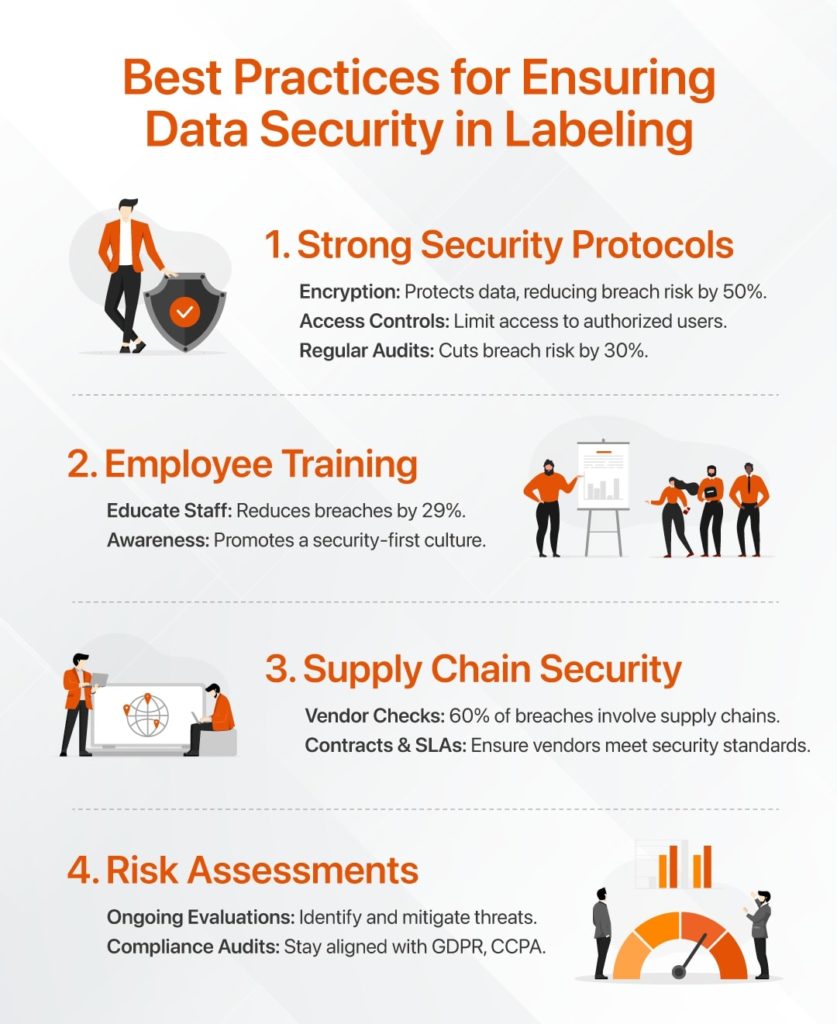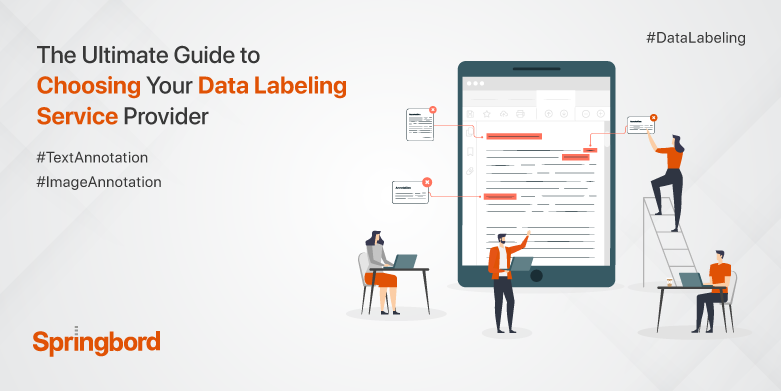 Read time 5 min
Read time 5 minLabelling is more than just product identification; it is an important process that affects supply chains, compliance, and brand reputation. However, as labelling relies increasingly on digital systems, the risk of data breaches grows. Data security in labelling is not just a technical concern; it’s a vital business imperative. In this blog, we’ll explore the importance of safeguarding labelling data, the threats you face, and the best practices to protect your business from costly breaches.
Labelling is no longer a simple task of attaching names or descriptions to products; it’s a sophisticated process that involves managing and securing essential data across multiple stages of the supply chain. As businesses increasingly rely on digital systems to manage labeling, the importance of data security has grown exponentially.
Data breaches in labelling can have far-reaching consequences, affecting not only the integrity of the products but also the business’s reputation, legal standing, and financial stability.
Data Security in Labeling
Data security is essential to labelling because it guarantees that all of the information used in the process—whether it be customer, product, or compliance data—remains accurate and secure from unauthorized access.
In 2023, the average cost of a data breach was estimated at $4.45 million, a figure that highlights the severe financial impact a breach can have on businesses.
Springbord, with its expertise in data management, helps businesses enhance labelling security by using advanced technologies and industry best practices, ensuring efficient and secure labelling processes that protect against data breaches.
Impact of Data Breaches in Labeling
Data breaches in labelling can have severe legal, reputational, and financial consequences for businesses.
- Legal and Compliance Issues
One of the most immediate impacts of a data breach in labeling is the legal and compliance ramifications. Regulations like the General Data Protection Regulation (GDPR) and the California Consumer Privacy Act (CCPA) impose stringent requirements on how businesses handle personal data. Serious penalties may result from breaking these regulations.
- Reputational Damage
A data breach can damage a company’s reputation, eroding customer trust and brand loyalty. In an era where consumers are increasingly aware of data privacy issues, a breach can result in a significant loss of business as customers move to competitors they perceive as more secure. The long-term impact on brand reputation can be difficult to repair, making it essential for businesses to proactively secure their labelling processes.
- Financial Consequences
A data breach can have disastrous financial consequences. Beyond the immediate costs of fines and legal fees, businesses may face substantial expenses related to breach remediation, including costs for investigating the breach, notifying affected parties, and implementing stronger security measures. Additionally, companies may experience lost revenue due to operational disruptions and reduced customer confidence, further compounding the financial toll.
Springbord’s expertise in securing labelling processes helps businesses avoid these risks, ensuring data protection, regulatory compliance, and safeguarding financial stability.
Best Practices for Ensuring Data Security in Labeling
As data breaches become more sophisticated and costly, incorporating strong data security measures into labelling processes is more important than ever. Ensuring the security of your labelling data requires a multi-faceted approach, encompassing technical controls, employee training, and thorough risk management strategies.

Here are some key best practices to help safeguard your labelling processes:
1. Implementing strong security protocols.
The foundation of any secure labelling process is a strong set of security protocols. Key techniques include:
- Encryption: Encrypting data both at rest and in transit is essential for protecting sensitive labelling information from unauthorized access. According to a 2023 report by Cybersecurity Ventures, the use of encryption can reduce the likelihood of a data breach by nearly 50%.
- Access Controls: Strict access controls guarantee that sensitive data is only accessible by authorised personnel. Role-based access control (RBAC) systems are particularly effective, as they limit data access based on the user’s role within the organization.
- Regular Security Audits: Conducting frequent security audits helps identify vulnerabilities in your labelling processes. According to a study by IBM, organizations that regularly audit their security systems experience 30% fewer breaches than those that do not.
2. Employee Training and Awareness
Human error is a leading cause of data breaches, making employee training an important component of data security in labelling:
- Educating Staff: Regular training sessions on data security best practices can significantly reduce the risk of breaches. According to the Ponemon Institute, organizations with comprehensive training programs experience 29% fewer breaches.
- Awareness Programs: Developing awareness programs that highlight the importance of data security can help foster a culture of security within the organization. Simple practices, such as recognizing phishing attempts, can prevent potential breaches.
3. Supply Chain Security Management
It is imperative to guarantee that third-party partners follow stringent data security guidelines, since vulnerabilities in the supply chain may compromise the security of your labeling.
- Vendor Security Assessments: Regularly assess the security practices of third-party vendors involved in the labelling process. A Gartner report found that 60% of organizations suffered a data breach due to vulnerabilities in their supply chain.
- Contracts and SLAs: Ensure that data security requirements are clearly outlined in contracts and Service Level Agreements (SLAs) with vendors. This can help hold third parties accountable for maintaining high-security standards.
4. Regular Risk Assessments and Audits
Ongoing evaluation of data security measures is essential for maintaining a secure labelling process.
- Risk Assessments: To find possible security threats, regularly conduct risk assessments. These assessments should cover all aspects of the labelling process, from data storage to access controls.
- Compliance Audits: Regular audits ensure your labelling processes comply with relevant data protection regulations, such as GDPR and CCPA. Serious repercussions for noncompliance can include fines and harm to one’s reputation.

Springbord, with its extensive experience in managing data-intensive operations, is well-equipped to help businesses implement these best practices. Springbord makes sure that your labelling procedures stay safe, legal, and resistant to new threats by utilizing cutting-edge security technologies and a proactive approach to risk management.
Conclusion
Assuring the security of your labelling procedures is not only a best practice but also a business requirement in a time when data security is crucial. The impact of data breaches in labelling can be far-reaching, affecting legal compliance, brand reputation, and financial stability.
Businesses can safeguard their labelling procedures against the growing threat of cyberattacks by putting strong security protocols in place, training staff, managing supply chain risks, and performing frequent audits.
Springbord specializes in data labeling services with a focus on process security. Leveraging advanced technologies and industry-leading best practices, we ensure your data labeling needs are met with the highest standards of accuracy and security.
Our expertise in data management guarantees that your business remains compliant, protected, and resilient against emerging threats.
Contact Springbord today to learn how we can help safeguard your labelling processes and fortify your business against data breaches.
FAQ
What is data security and why is it important?
Data security protects sensitive information from unauthorized access, preventing losses, legal issues, and reputation damage.
What are the main types of data breaches?
Data breaches can happen through hacking, phishing, lost devices, insider threats, or poor security.
What is the role of encryption in data security?
Encryption secures data by converting it into unreadable format, protecting it from unauthorized access.
How can businesses protect their data from cyberattacks?
Businesses can protect data using encryption, multi-factor authentication, access controls, and regular security checks.
Why is data security particularly important in labeling processes?
Data security in labeling ensures that critical information stays accurate and safe throughout the supply chain.
What are the consequences of a data breach in labeling?
A data breach in labeling can lead to legal penalties, damage to reputation, and high costs for fixing the issue.
What best practices should businesses follow to secure their labeling data?
Businesses should use encryption, set access controls, train staff, audit security, and manage third-party risks.







